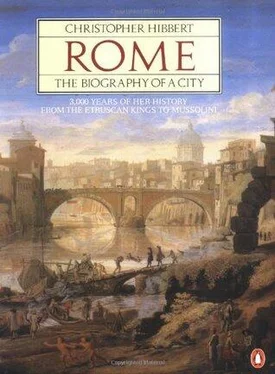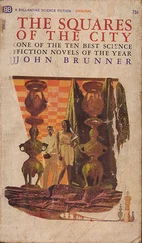Christopher Hibbert - Rome. The Biography of the City
Здесь есть возможность читать онлайн «Christopher Hibbert - Rome. The Biography of the City» весь текст электронной книги совершенно бесплатно (целиком полную версию без сокращений). В некоторых случаях можно слушать аудио, скачать через торрент в формате fb2 и присутствует краткое содержание. Жанр: Культурология, Искусство и Дизайн, на английском языке. Описание произведения, (предисловие) а так же отзывы посетителей доступны на портале библиотеки ЛибКат.
- Название:Rome. The Biography of the City
- Автор:
- Жанр:
- Год:неизвестен
- ISBN:нет данных
- Рейтинг книги:3 / 5. Голосов: 1
-
Избранное:Добавить в избранное
- Отзывы:
-
Ваша оценка:
- 60
- 1
- 2
- 3
- 4
- 5
Rome. The Biography of the City: краткое содержание, описание и аннотация
Предлагаем к чтению аннотацию, описание, краткое содержание или предисловие (зависит от того, что написал сам автор книги «Rome. The Biography of the City»). Если вы не нашли необходимую информацию о книге — напишите в комментариях, мы постараемся отыскать её.
Rome. The Biography of the City — читать онлайн бесплатно полную книгу (весь текст) целиком
Ниже представлен текст книги, разбитый по страницам. Система сохранения места последней прочитанной страницы, позволяет с удобством читать онлайн бесплатно книгу «Rome. The Biography of the City», без необходимости каждый раз заново искать на чём Вы остановились. Поставьте закладку, и сможете в любой момент перейти на страницу, на которой закончили чтение.
Интервал:
Закладка:
Matters, however, were far from settled. ‘The state of things is perfectly shocking,’ one of Caesar's associates reported. ‘There is no way out of the mess. For if a man with Caesar's genius failed, who can hope to succeed?’ The Dictator was dead; but the Republic was not restored: power remained in the hands of those who could command the support of the legionaries and it could be seized by any man who, assured of this support, could force the Senate to accept an autarchy.
Mark Antony, still Consul, saw himself as that man. When Caesar's body was brought back to the Forum from Pompey's Theatre, he made a moving funeral oration which Shakespeare's imagination has rendered unforgettable. Antony's words, the sight of Caesar's lacerated body and the rumoured contents of the dead man's will which was said to have bequeathed a legacy to each Roman citizen, combined to arouse the people to frenzy. They tore down railings, they smashed benches and tables to make a pyre upon which Caesar's body was burned; they then rampaged through the city with blazing brands, setting fire to the houses of his assassins. Brutus and Cassius escaped from Rome, and Antony later allowed them to assume commands in the East.
Antony's general policy was, indeed, one of appeasement. He issued orders in Caesar's name, having taken possession of his papers, and he erected a statue in the Forum dedicated to Caesar, ‘Glorious Father of the Country'; but he stamped out a rapidly developing cult of Caesar's divinity and abolished for ever the title of Dictator. In his endeavours to take over control of the state, Antony was, however, at a serious disadvantage, for Caesar had nominated as his personal heir his great-nephew and adopted son, a brilliant, astute, calculating soldier, not yet nineteen years old, who now took the name Gaius Julius Caesar Octavianus. For a time Antony ruled in conjunction with the young Octavian and Marcus Aemilius Lepidus, an aristocratic former deputy of Caesar who had proposed him for the dictatorship. These three men defeated a Republican army at the battle of Philippi after which both Brutus and Cassius killed themselves. Cicero was put to death; and despite Antony's earlier objections, Caesar was declared a god, and Octavian was thus elevated to the status of a god's son.
Octavian made much of this relationship; and when he and Antony, having disposed of Lepidus, divided the Roman empire between them, coins in the western part of the empire, whose capital was at Rome, described Octavian, its ruler, as ‘Son of the Divine Julius’. At the same time, in the eastern empire Antony, now Cleopatra's lover, endorsed her claim that Caesarion was Caesar's son and rightful heir. The inevitable and final clash between the two rival parties came at Actium outside the Gulf of Ambracia. Here in 31 B.C. Octavian's fleet, commanded by his friend, Marcus Vipsanius Agrippa, overwhelmed the ships of Antony and Cleopatra who fled to Egypt where, the next year, they both killed themselves at Alexandria.
Vastly enriched by Cleopatra's treasure, Octavian returned to Rome where by gradual and cautious degrees, shrewdly and carefully placating Republican sentiments and skilfully taking advantage of the Roman people's desire for peace after civil strife, he established himself as the leading man of the state. Short of stature, often ill and more often believing himself to be ill, he did not possess the personal magnetism of Julius Caesar. Nor did he possess Caesar's great gifts as a general; but he chose his deputies with well-judged discrimination, kept strict discipline within the legions and retained the loyalty of his friends, as well as the support of some of the greatest poets and writers who flourished in his time. Ovid, immoral and self-indulgent, offended him and was exiled to Romania; while Livy's reservations about Julius Caesar and his admiration for Caesar's enemies led Octavian to refer to him as a ‘Pompeian’. But Virgil expressed his approval of Octavian and so did Horace who became his friend, though he had fought against him under Brutus and Cassius at Philippi.
Octavian could be ruthless, not only with his opponents but also with those members of his family who offended his taste for a simple and well-regulated life: he banished his daughter, and then his granddaughter, when they fell into company of which he disapproved. Yet he was never a tyrant, and his adoption ofthe grave and exalted name Augustus, signifying a man who enjoyed the divine gift of carrying out his enterprises under favourable auspices, and later the title of Pater Patriae was accepted by the Romans who recognized his firm sense of duty and who welcomed his reforms and the lasting peace which accompanied them. This peace was commemorated in Rome by that beautiful monument of white marble, the Ara Pacis Augustae, the Altar of Augustan Peace, which was consecrated in 13 B.C. in a ceremony attended, as the frieze depicts, by great officers of state accompanied by lictors with their rods, by priests and by Flamens in their strange spiked skull caps, by members of the imperial family and by Augustus himself. 8
The Pater Patriae kept the people of Rome content with liberal supplies of food and lavish entertainments. He established an effective police force, a fire-brigade and a strong, permanent bodyguard, the Praetorian Guard. He also inaugurated a building programme which was more ambitious by far than Julius Caesar's and by which, so he proudly declared, he transformed a city of brick into one of marble. With the help of a team of architects, mostly no doubt Greek, he constructed a new Forum to the north and at right angles to his adoptive father's, flanking it with immense colonnades and two large side apses between a temple filled with treasures and dedicated to Mars the Avenger, 9in commemoration of his victory at Philippi where retribution for Caesar's murder was exacted. Another splendid new temple was raised in honour of his deified father, 10and, nearby, a new Rostra. Augustus also ordered the reconstruction of the Basilica Julia which had been burned down, as well as of the ancient shrine of the Lares and Penates, household gods of the Roman state, and of the ancient Basilica Aemilia which had been used for generations as a meeting-place and as a centre for money changers, remains of whose copper coins fused into the stone by the heat of fire during a Gothic invasion of the declining Empire can still be seen in the green stains in the Basilica's pavement. 11At the same time, various members of Augustus's family and friends were responsible for the restoration of the Temple of Saturn, 12the treasury of the Roman state, the Temples of Concord 13and of Castor and Pollux, 14and the official house of the Pontifex Maximus. 15
On the Capitol, Augustus himself restored, at what he proudly described as ‘great expense’, the fine temple of Jupiter; and, in fulfilment of a vow he had made after having escaped being struck by lightning in Spain, he built a new temple to Jupiter Tonans. 16On the Palatine hill he erected a huge new temple to Apollo with fine porticoes and libraries at the side, 17and he converted the Lupercal, the cave in which Romulus and Remus had been suckled by the wolf, into an ornamental grotto. 18On the Quirinal he reconstructed the temple of Quirinus where Romulus was worshipped as Mars; 19on the Aventine he restored the ancient Temples of Diana 20and of Juno Regina. 21Below them he built a huge circular Etruscan mausoleum with a steeply pitched conical roof of earth planted with cypress trees. 22And, downstream from this, opposite the island in the Tiber reached by the Ponte Fabricio, he completed the Theatre of Marcellus which, named after his nephew, was later to be transformed into one of Rome's grand Renaissance palaces. 23
After the death of Augustus in A.D. 14, his strong-willed widow, Livia, continued to live on the outskirts of Rome in a fine villa at Prima Porta. The exquisitely decorated plaster of one of the rooms, painted with birds and flowers in a trompel'œil manner that makes the representation of a little bird-cage astonishingly real, has been preserved in the Museo delle Terme. 24Livia also had a smaller house on the Palatine, perhaps the one now known as the Casa di Livia; 25and this, too, had walls beautifully painted with fruits and flowers and with mythological scenes set amidst temples and porticoes. It was here on the Palatine that Livia's wary and grimly sarcastic son, Tiberius, who succeeded Augustus, built himself the palace known as the Domus Tiberiana, the first of those grand imperial buildings which were soon to spread all over the hill. 26But grand as it must have been, this palace, whose floors disappeared in the sixteenth century beneath the Orti Farnesiani, 27was almost modest compared with the fantastic Golden House of the Emperor Nero.
Читать дальшеИнтервал:
Закладка:
Похожие книги на «Rome. The Biography of the City»
Представляем Вашему вниманию похожие книги на «Rome. The Biography of the City» списком для выбора. Мы отобрали схожую по названию и смыслу литературу в надежде предоставить читателям больше вариантов отыскать новые, интересные, ещё непрочитанные произведения.
Обсуждение, отзывы о книге «Rome. The Biography of the City» и просто собственные мнения читателей. Оставьте ваши комментарии, напишите, что Вы думаете о произведении, его смысле или главных героях. Укажите что конкретно понравилось, а что нет, и почему Вы так считаете.












